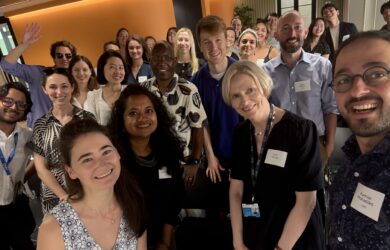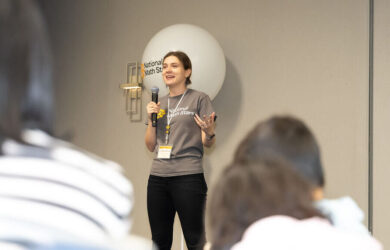
Dr Christian Boehm co-authors article on the long- and short-term opportunities and risks presented by bioengineering.
As these technologies emerge and develop, we must ensure public trust and acceptance...proceeding without the appropriate safety precautions and societal consensus - whatever the public health benefits - could damage the field for many years to come.
Dr Christian Boehm
Human genome editing, 3D-printed replacement organs and artificial photosynthesis – the field of bioengineering offers great promise for tackling the major challenges that face our society. But a new article co-written by a Gates Cambridge Scholar highlights that these developments provide both opportunities and risks in the short and long term.
Rapid developments in the field of synthetic biology and its associated tools and methods, including more widely available gene editing techniques, have substantially increased our capabilities for bioengineering – the application of principles and techniques from engineering to biological systems, often with the goal of addressing 'real-world' problems.
In a feature article published in the open access journal eLife, an international team of experts led by Dr Bonnie Wintle and Gates Cambridge Scholar Dr Christian R. Boehm from the Centre for the Study of Existential Risk at the University of Cambridge, capture perspectives of industry, innovators, scholars and the security community in the UK and US on what they view as the major emerging issues in the field.
Dr Wintle says: “The growth of the bio-based economy offers the promise of addressing global environmental and societal challenges, but as our paper shows, it can also present new kinds of challenges and risks. The sector needs to proceed with caution to ensure we can reap the benefits safely and securely.”
The report is intended as a summary and launching point for policy makers across a range of sectors to further explore those issues that may be relevant to them.
Among the issues highlighted by the report as being most relevant over the next five years are:
Artificial photosynthesis and carbon capture for producing biofuels
If technical hurdles can be overcome, such developments might contribute to the future adoption of carbon capture systems, and provide sustainable sources of commodity chemicals and fuel.
Enhanced photosynthesis for agricultural productivity
Synthetic biology may hold the key to increasing yields on currently farmed land – and hence helping address food security – by enhancing photosynthesis and reducing pre-harvest losses, as well as reducing post-harvest and post-consumer waste.
Synthetic gene drives
Gene drives promote the inheritance of preferred genetic traits throughout a species, for example to prevent malaria-transmitting mosquitoes from breeding. However, this technology raises questions about whether it may alter ecosystems, potentially even creating niches where a new disease-carrying species or new disease organism may take hold.
Human genome editing
Genome engineering technologies such as CRISPR/Cas9 offer the possibility to improve human lifespans and health. However, their implementation poses major ethical dilemmas. It is feasible that individuals or states with the financial and technological means may elect to provide strategic advantages to future generations.
Defence agency research in biological engineering
The areas of synthetic biology in which some defence agencies invest raise the risk of ‘dual-use’. For example, one programme intends to use insects to disseminate engineered plant viruses that confer traits to the target plants they feed on, with the aim of protecting crops from potential plant pathogens – but such technologies could plausibly also be used by others to harm targets.
In the next five to ten years, the authors identified areas of interest including:
Regenerative medicine: 3D printing body parts and tissue engineering
While this technology will undoubtedly ease suffering caused by traumatic injuries and a myriad of illnesses, reversing the decay associated with age is still fraught with ethical, social and economic concerns. Healthcare systems would rapidly become overburdened by the cost of replenishing body parts of citizens as they age and could lead new socioeconomic classes, as only those who can pay for such care themselves can extend their healthy years.
Microbiome-based therapies
The human microbiome is implicated in a large number of human disorders, from Parkinson’s to colon cancer, as well as metabolic conditions such as obesity and type 2 diabetes. Synthetic biology approaches could greatly accelerate the development of more effective microbiota-based therapeutics. However, there is a risk that DNA from genetically engineered microbes may spread to other microbiota in the human microbiome or into the wider environment.
Intersection of information security and bio-automation
Advancements in automation technology combined with faster and more reliable engineering techniques have resulted in the emergence of robotic 'cloud labs' where digital information is transformed into DNA then expressed in some target organisms. This opens the possibility of new kinds of information security threats, which could include tampering with digital DNA sequences leading to the production of harmful organisms, and sabotaging vaccine and drug production through attacks on critical DNA sequence databases or equipment.
Over the longer term, issues identified include:
New makers disrupt pharmaceutical markets
Community bio-labs and entrepreneurial startups are customizing and sharing methods and tools for biological experiments and engineering. Combined with open business models and open source technologies, this could herald opportunities for manufacturing therapies tailored to regional diseases that multinational pharmaceutical companies might not find profitable. But this raises concerns around the potential disruption of existing manufacturing markets and raw material supply chains as well as fears about inadequate regulation, less rigorous product quality control and misuse.
Platform technologies to address emerging disease pandemics
Emerging infectious diseases – such as recent Ebola and Zika virus disease outbreaks – and potential biological weapons attacks require scalable, flexible diagnosis and treatment. New technologies could enable the rapid identification and development of vaccine candidates and plant-based antibody production systems.
Shifting ownership models in biotechnology
The rise of off-patent, generic tools and the lowering of technical barriers for engineering biology has the potential to help those in low-resource settings, benefit from developing a sustainable bioeconomy based on local needs and priorities, particularly where new advances are made open for others to build on.
Professor Johnathan Napier from Rothamsted Research comments: “The challenges embodied in the Sustainable Development Goals will require all manner of ideas and innovations to deliver significant outcomes. In agriculture, we are on the cusp of new paradigms for how and what we grow, and where. Demonstrating the fairness and usefulness of such approaches is crucial to ensure public acceptance and also to delivering impact in a meaningful way.”
Dr Boehm [2013], who did his PhD in Plant Sciences with the support of a Gates Cambridge Scholarship, concludes: “As these technologies emerge and develop, we must ensure public trust and acceptance. People may be willing to accept some of the benefits, such as the shift in ownership away from big business and towards more open science and the ability to address problems that disproportionately affect the developing world, such as food security and disease. But proceeding without the appropriate safety precautions and societal consensus – whatever the public health benefits – could damage the field for many years to come.”
The research has been covered by BBC Radio 4's Inside Science programme here.

Christian Boehm
- Alumni
- Germany
- 2013 PhD Plant Sciences
- Christ's College












